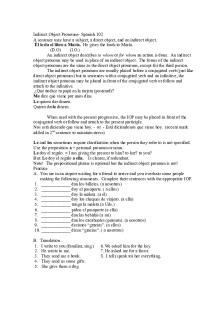Indirect Object Pronouns PDF

| Title | Indirect Object Pronouns |
|---|---|
| Course | Elem Span Ii |
| Institution | Southeastern Louisiana University |
| Pages | 1 |
| File Size | 67.7 KB |
| File Type | |
| Total Downloads | 50 |
| Total Views | 135 |
Summary
Professor: Marianna Kunow...
Description
Indirect Object Pronouns- Spanish 102 A sentence may have a subject, a direct object, and an indirect object. Él le da el libro a María. He gives the book to María. (D.O) (I.O.) An indirect object describes to whom or for whom an action is done. An indirect object pronoun may be used in place of an indirect object. The forms of the indirect object pronouns are the same as the direct object pronouns, except for the third person. The indirect object pronouns are usually placed before a conjugated verb (just like direct object pronouns) but in sentences with a conjugated verb and an infinitive, the indirect object pronoun may be placed in front of the conjugated verb or follow and attach to the infinitive. ¿Qué te dice tu papá en la tarjeta (postcard)? Me dice que viene por unos días. Le quiero dar dinero. Quiero darle dinero. When used with the present progressive, the IOP may be placed in front of the conjugated verb or follow and attach to the present participle. Nos está diciendo que viene hoy. - or - Está diciéndonos que viene hoy. (accent mark added in 2nd sentence to maintain stress) Le and les sometimes require clarification when the person they refer to is not specified. Use the preposition a + personal pronoun or noun. Le doy el regalo. = I am giving the present to him? to her? to you? But: Le doy el regalo a ella. Is clearer, if redundant. Note! The prepositional phrase is optional but the indirect object pronoun is not! Practice A. You are in an airport waiting for a friend to arrive and you overhear some people making the following comments. Complete their sentences with the appropriate IOP. 1. _____________ dan los billetes. (a nosotros) 2. _____________ doy el pasaporte. ( a ellos) 3. _____________ doy la maleta. (a él) 4. _____________ doy los cheques de viajero. (a ella) 5. _____________ traigo la maleta (a Uds.) 6. _____________ piden el pasaporte (a ella) 7. _____________ dan las bebidas (a mí) 8. _____________ dan los cacahuates (peanuts). (a nosotros) 9. _____________ decimos “gracias”. (a ellos) 10. _____________ dicen “gracias”. ( a nosotros) B. 1. 2. 3. 4. 5.
Translation. I write to you (familiar, sing.) He wrote to me. They send me a book. They send us some gifts. She gave them a dog.
6. We asked him for the key. 7. He asked me for a favor. 8. I tell (speak to) her everything....
Similar Free PDFs

Indirect Object Pronouns
- 1 Pages

Indirect Object Pronouns
- 2 Pages

The Indirect Object essay
- 7 Pages

Subject Pronouns
- 1 Pages

Indirect realism essay
- 3 Pages

Grammar 3.1.2 Indirect Questions
- 8 Pages

Logic 19 Conditional Indirect
- 3 Pages

Possessive Pronouns Le Mien
- 2 Pages
Popular Institutions
- Tinajero National High School - Annex
- Politeknik Caltex Riau
- Yokohama City University
- SGT University
- University of Al-Qadisiyah
- Divine Word College of Vigan
- Techniek College Rotterdam
- Universidade de Santiago
- Universiti Teknologi MARA Cawangan Johor Kampus Pasir Gudang
- Poltekkes Kemenkes Yogyakarta
- Baguio City National High School
- Colegio san marcos
- preparatoria uno
- Centro de Bachillerato Tecnológico Industrial y de Servicios No. 107
- Dalian Maritime University
- Quang Trung Secondary School
- Colegio Tecnológico en Informática
- Corporación Regional de Educación Superior
- Grupo CEDVA
- Dar Al Uloom University
- Centro de Estudios Preuniversitarios de la Universidad Nacional de Ingeniería
- 上智大学
- Aakash International School, Nuna Majara
- San Felipe Neri Catholic School
- Kang Chiao International School - New Taipei City
- Misamis Occidental National High School
- Institución Educativa Escuela Normal Juan Ladrilleros
- Kolehiyo ng Pantukan
- Batanes State College
- Instituto Continental
- Sekolah Menengah Kejuruan Kesehatan Kaltara (Tarakan)
- Colegio de La Inmaculada Concepcion - Cebu







